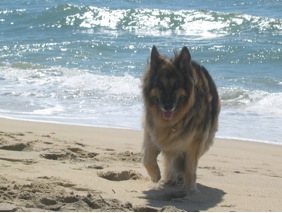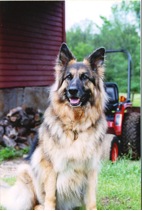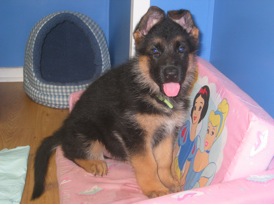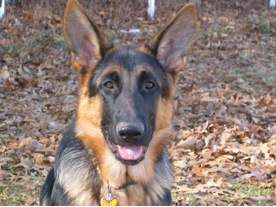Last Updated: 23 May 2008





















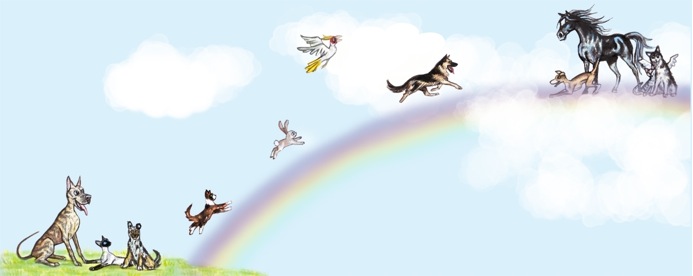
Nothing prepared me for the anguish I felt when I lost one of my young dogs, suddenly & unexpectedly. The shock of a shadowy nightmare coming true overwhelmed me. I knew that accidents or health problems could happen and take a young dog’s life. I just never really thought it would be my dog! I could not get my mind around the concept that my boy was gone. Time passed, and other dogs came into my life, but I never quite recovered from the loss. I had lingering irrational fears about my young dogs – dogs who should have long lives ahead of them - dying unexpectedly. I could not think about my departed dog without reliving the day he died, and all the pain that came with his passing. I knew I should not torment myself by reliving the day. I knew that my other young dogs were healthy. But, the fear remained.
Within a year of that loss, my elderly dog developed an illness (unknown to any of us) & deteriorated quickly. Even though I had known somewhere in my rational brain that she would not be with us much longer – 14 is old for a German Shepherd Dog - I was still caught emotionally unprepared. I had thought about how she might go, my husband and I had discussed what we would do or not do when her time came. And yet, when the time did come, none of my aforethought helped my grief to be less. A loss is a loss, be it a young dog or old. I was very lucky in that, my vet came to our home, my old girl went with dignity, and I was with her.
As a breeder, I talk to many families who are looking for a puppy after having lost a beloved pet – sometimes very recently, other times it has been a long time, and the family only feels ready now.
For all of these people, and for myself, the loss of our dog has been the loss of a family member, and it hurts deeply. To those who are struggling with new grief, please know that you are not alone. There are many who will not understand the pain of a lost pet… but there are also many who do.
I offer here some articles on pet bereavement, euthanasia, some poems, and an invitation to our Puppy Families,to email me a photo of your special GSD and a few lines In Memory. I will post those here.
To go directly to other topics on this page, click on the appropriate title:
LOSS OF A PET
My Own Special Angel Dogs:
In Memory of TIA, the Best of the Best. My “dog-ter”, my friend, my heart dog.
And in Memory of VP Amerigo vom Traumhof “RIGO”, the ball loving, happiest spirit ever, who always made me proud.
Forever in my Heart.
( Celine Dion’s My Heart Will Go on)
Every night in my dreams
I see you, I feel you
That is how I know you go on.
Far across the distance and spaces between us
You have come to show you go on.
Near, far, wherever you are
I believe that the heart does go on.
Once more you open the door
And you're here in my heart
And my heart will go on and on.
Love can touch us one time and last for a lifetime
And never let go till we're gone.
Love was when I loved you
One true time I hold to
In my life we'll always go on.
Near, far wherever you are
I believe that the heart does go on.
Once more, you open the door
And you're here in my heart
And my heart will go on and on.
You're here, there's nothing I fear
And I know that my heart will go on.
We'll stay forever this way
You are safe in my heart
And my heart will go on and on.


Just this side of heaven is a place called Rainbow Bridge.
When an animal dies that has been especially close to someone here, that pet goes to Rainbow Bridge.
There are meadows and hills for all of our special friends so they can run and play together.
There is plenty of food, water and sunshine, and our friends are warm and comfortable.
All the animals who had been ill and old are restored to health and vigor; those who were hurt or maimed are made whole and strong again, just as we remember them in our dreams of days and times gone by.
The animals are happy and content, except for one small thing; they each miss someone very special to them, who had to be left behind.
They all run and play together, but the day comes when one suddenly stops and looks into the distance. His bright eyes are intent; His eager body quivers. Suddenly he begins to run from the group, flying over the green grass, his legs carrying him faster and faster.
You have been spotted, and when you and your special friend finally meet, you cling together in joyous reunion, never to be parted again. The happy kisses rain upon your face; your hands again caress the beloved head, and you look once more into the trusting eyes of your pet, so long gone from your life but never absent from your heart.
Then you cross Rainbow Bridge together....
Author unknown...

The House Dog's Grave
I've changed my ways a little; I cannot now
Run with you in the evenings along the shore,
Except in a kind of dream; and you, if you dream a moment,
You see me there.
So leave awhile the paw-marks on the front door
Where I used to scratch to go out or in,
And you'd soon open; leave on the kitchen floor
The marks of my drinking-pan.
I cannot lie by your fire as I used to do
On the warm stone,
Nor at the foot of your bed; no, all the night through
I lie alone.
But your kind thought has laid me less than six feet
Outside your window where firelight so often plays,
And where you sit to read--and I fear often grieving for me--Every night your lamplight lies on my place.
You, man and woman, live so long, it is hard
To think of you ever dying
A little dog would get tired, living so long.
I hope than when you are lying
Under the ground like me your lives will appear
As good and joyful as mine.
No, dear, that's too much hope: you are not so well cared for
As I have been.
And never have known the passionate undivided
Fidelities that I knew.
Your minds are perhaps too active, too many-sided. . . .
But to me you were true.
You were never masters, but friends. I was your friend.
I loved you well, and was loved. Deep love endures
To the end and far past the end. If this is my end,
I am not lonely. I am not afraid. I am still yours.
Robinson Jeffers, 1941
There are various places within which a dog may be buried. We are thinking now of a setter, whose coat was flame in the sunshine, and who, so far as we are aware, never entertained a mean or an unworthy thought. This setter is buried beneath a cherry tree, under four feet of garden loam, and at its proper season the cherry strews petals on the green lawn of his grave. Beneath a cherry tree, or an apple, or any flowering shrub of the garden, is an excellent place to bury a good dog. Beneath such trees, such shrubs, he slept in the drowsy summer, or gnawed at a flavorous bone, or lifted head to challenge some strange intruder. These are good places, in life or in death. Yet it is a small matter, and it touches sentiment more than anything else.
For if the dog be well remembered, if sometimes he leaps through your dreams actual as in life, eyes kindling, questing, asking, laughing, begging, it matters not at all where that dog sleeps at long and at last. On a hill where the wind is unrebuked and the trees are roaring, or beside a stream he knew in puppyhood, or somewhere in the flatness of a pasture land, where most exhilarating cattle graze. It is all one to the dog, and all one to you, and nothing is gained, and nothing lost -- if memory lives. But there is one best place to bury a dog. One place that is best of all.
If you bury him in this spot, the secret of which you must already have, he will come to you when you call -- come to you over the grim, dim frontiers of death, and down the well-remembered path, and to your side again. And though you call a dozen living dogs to heel they should not growl at him, nor resent his coming, for he is yours and he belongs there.
People may scoff at you, who see no lightest blade of grass bent by his footfall, who hear no whimper pitched too fine for mere audition, people who may never really have had a dog. Smile at them then, for you shall know something that is hidden from them, and which is well worth the knowing.
The one best place to bury a good dog is in the heart of his master.
by Ben Hur Lampman

Where to Bury a Dog
( Copied From : The Association For Pet Loss and Bereavement
As a pet owner, none of us like to think of the day, seemingly far in the future, when we must say good-bye to our pet. Though the thought may briefly skim through our minds from time to time, we seldom dwell on it. It is natural to feel we have a lifetime to enjoy our dear pets. Unfortunately, because their lives are far shorter than ours, we must always be ready to face this terrible decision.
The more you educate yourself about euthanasia - ahead of time - the less likely you will be to question the decision or procedure, afterward. This can help prevent those feelings of wishing you had done some things differently, and it may relieve some of the guilt that inevitably follows. Making the decision to euthanize your pet involves intense conflicting emotions.
DECIDING WHEN THE TIME IS RIGHT
The decision of when to euthanize is as individual and personal as you and your pet are. This is a judgment that only you can make, and it involves great personal courage and sacrifice. Many people fear they will not be able to recognize when the time is right. Do not hesitate to seek guidance from your veterinarian. It is good to include family members or friends who share a close bond with your pet in the decision-making process. This is a time when you will need the support of those who truly understand.
Some important things to take into consideration as you contemplate this decision may be:
·Does your pet still seem to enjoy life? Is he/she able to carry out normal body functions as before - eating, walking, and eliminating?
·Is your pet in pain?
·What is the prognosis for your pet? What are the treatment options? Will they create an uncomfortable quality of life for your pet?
·Are you able to afford the cost of treatment? For some, this must be the overriding consideration.
·It may be helpful to weigh the good days versus the bad days. When the bad override the good, it may be time.
·Remember, no one knows your pet better than you do. You have spent a great deal of time learning to communicate with your pet by reading his/her body language. Attend to what your pet may be trying to communicate. And trust what your heart tells you.
MAKING THE APPOINTMENT
Once you have made the decision to euthanize your pet, the next step is making the appointment. The timing is often critical, and you may need to act quickly. Some people prefer to spend a few final days with their pet. If you do have the time to plan ahead, it is a good idea to first discuss with your veterinarian all aspects of what to expect. Some important considerations are:
·Will the veterinarian who cared for you pet be the one performing the euthanasia?
·Consider the time of day and the day of the week. You will need time before and after to deal with your emotions. You may need to take a day or two off from work. Do not hesitate to care for yourself. You are important. You are making a decision based on what is best for your pet. Make some decisions that are the best for you, as well.
The euthanasia procedure is typically done at the veterinarian's office, but can also be performed at home. Your veterinarian may or may not offer this service, and if you prefer, he/she may be able to offer a referral. If not, then you have some important research and networking to do. Euthanasia is normally a quick, peaceful, and virtually pain-free procedure for your pet, regardless of where it is performed.
The following information is to help you understand what will take place during the euthanasia process and how your pet's body may react. We have included some additional advice that will be useful, afterward.
THE EUTHANASIA PROCESS
The euthanasia process itself is designed to be as quick and peaceful for you and your pet as possible. Euthanasia solution is ideally injected intravenously, usually in the animal's front or back leg, and is a fast-acting sedative which stops the heart within a very short period of time. When the veterinarian is ready to begin the procedure an assistant will usually be asked to help hold your pet. After shaving the area, a needle or catheter is inserted into the vein. The veterinarian will test it first, to make sure it is in the vein and that the solution is administered as desired. Your veterinarian may choose to sedate your pet or place an intravenous catheter beforehand to help ensure a smooth procedure. If sedation is used, it will be administered first, allowing the animal to relax and fall into a comfortable deep sleep. A veterinarian may also choose to administer the euthanasia solution into the vein by itself. Once the euthanasia solution is given, the animal's muscles will relax and the heart will stop beating. Most owners are surprised at how quickly death comes - in seconds.
In some instances, the muscles may contract or relax for a few seconds after the heart has stopped. As muscles relax, the animal may void urine and/or stool. Other involuntary contractions may occur, such as the animal appearing to gasp, or moving the extremities. But it is important to realize that this is strictly a muscle reflex, and the life is already gone. Also, the eyes may not close. Try to remember that your pet is not aware of any of these things, as they happen after death has occurred. Most veterinarians will ask if you would like to spend a few moments alone with your pet.
Some pet owners initially think they will be more comfortable if they do not observe their pet's final moments, and would rather be in the waiting room (or elsewhere) during the procedure. But bear in mind that those who opt for not being present often later feel a terrible sense of guilt about this.
If possible, discuss with your veterinarian or his or her office staff before the appointment is made how euthanasia is performed at that particular office. Your pet's health, temperament, and your preferences should each be considered when making this decision. For very small, young, or exotic animals, there may be some differences from the procedure just described. Be sure that you are comfortable with the procedure that you and your veterinarian choose. You may need to find another veterinarian to do the procedure the way you prefer.
SAYING GOODBYE
Before these final moments, you will have to consider how you would like to say good-bye. You may be present for the process, and decide to do this before your pet enters the room, or just prior to the procedure. Some feel they have to say good-bye in the room before then, and leave. If you decide to return afterward, ask your veterinarian to close your pet's eyelids, before then.
As emotionally traumatic as it is, most pet owners feel they need to be present the entire time, hold their pet, and say good-bye during the euthanasia procedure. Most people spend private time with their pets before, as well as after. Each veterinarian has his own policies and procedures, however, and you always should discuss these, beforehand. Be fully informed and in charge, despite your terrible emotional strain. Unfortunately, a few veterinarians are closed-minded and insistent on doing things their own way, despite what anyone else may think or want. This is rare, but you may find it necessary to opt for a different veterinarian and procedure. You want to avoid having any possible misgivings, later. Despite the great tensions at this time we suggest that you do not let anyone insist on anything that you do not want.
Most veterinarians will keep the body until a prearranged pickup service retrieves it for burial or cremation. Generally, it is good to make all arrangements with the cremation or burial service long before that final day, so that the last moments with your pet are as unstressful as possible. Also your decision-making abilities will be better, at that time. If it is possible, arrange for someone to be with you.
If it is possible, arrange for someone to be with you.
AFTERCARE OPTIONS
There are several options for aftercare for your pet's body. These are always influenced by financial and personal considerations, or religious beliefs. Most veterinarians will inform you of the choices, as they generally have a financial relationship with a nearby crematory or pet cemetery. Cremation or burial are the most common preferences.
Cremation: This option enables you to keep your pet's ashes in an urn or other special container in your home, bury them - or even scatter them later, in a location that will be meaningful to you. And there is no time pressure on you to make any of these decisions.
You can have your pet's body cremated, either with other pets, or individually. In the less expensive group cremation there is no guarantee that the cremains that are returned (if requested) will be those of your pet. With individual cremation, the ashes are generally returned in an inexpensive box, to keep and deal with at your discretion. They will generally try to sell you an expensive urn. But usually owners, can find something they greatly prefer, later. At this point there is no rush to do that.
Usually, your veterinarian will be glad to make the arrangements and notify you when you can expect to have the ashes returned. Generally, pet owners are surprised at the small quantity of cremains that are returned. For example, a 75 pound dog's ashes will fill a space equivalent to about half a shoebox.
Burial: Burial at a pet cemetery is also a common choice. Each has its own requirements, and any specifics should be worked out in advance, between you, your vet, and the cemetery. Although somewhat costly, it also has a sense of permanence and respect that many pet owners appreciate. Some pet cemeteries or animal shelters also offer less expensive communal burial.
There are many pet cemeteries across the country. You can find them in the Yellow Pages, under Pet Mortuary Services, or through your veterinarian. And they can be found on the Internet. Most people don't realize at first that the quality of management can vary quite a bit. Again, we suggest that you investigate this, beforehand, if possible. Prices vary, but expect a plot to cost at least $100 for a small pet - with additional regular maintenance charges. You can supply your own casket or buy one from a reputable retailer. Prices can vary from $50 for a no-frills plastic shell, up to over $500 for a more elaborate casket. Although they may have quality merchandise, be wary of the sales pitch often made at the cemetery or crematory. Immediately after the death of a beloved pet is not the time for you to make a good choice. Try to make these arrangements beforehand.
Burial at home is preferred by many, but may not be practical, or permitted, in your area. Be sure to check your local zoning restrictions. Also, this option is not an option for those who live in a city or rent. Your veterinarian may have this information for you. If it is allowed, and you decide to bury your pet in the yard, keep in mind that one day you may relocate to a new home.
Whatever choices are made, you may want to bring a few personal items with you, to be buried or cremated with your pet's body. This may be a special toy, coat, flower, poem, picture, etc. Also, you may appreciate clipping and saving a bit of your pet's fur. Many pet owners take comfort in having this special remembrance.
PETS BEREAVING PETS
Losing a pet affects not only the people, but can also upset other pets in the home. The makeup of your family has changed with the loss of your pet, and you may notice that your surviving ones may also experience grief. Sometimes you will observe crying, loss of appetite, looking for the missing pet, oversleeping, house-raising mistakes, even disobedience. The adjustment to a new hierarchy within the home can also be a cause of change in behavior. If you feel the surviving animal is bereaving offer a special treat, a new toy - and most of all, extra attention from you. The grief should diminish over time, as does our own. It has been observed that the distress of pets is almost invariably made easier and briefer if they can observe and sniff the body of the deceased companion. There is a special article "Pets Bereaving Pets" in the Winter, 1998 APLB newsletter. This is available online to all APLB members.
SOME FINAL THOUGHTS
We get much love and delight from our beloved pets in life, and we grieve deeply for them when they die. Because of the unique enhancement they give to our lives they become a treasured part of us, forever. When a dear pet's life ends, more dies than just a cherished friend and companion. Since we make them into living symbols of our own innocence and purest feelings, a treasured secret part of each of us also dies. This can be reborn as we slowly pick up our shattered emotional pieces and move on. Our dear ones bless us, just as we do them, and they enrich and prepare us for our moving on in life. The loving memories become a permanent part of who we are, and they live on, in our hearts. Our continuing and improving lives can be our best memorials to them.

Ten Tips on Coping with Pet Loss
by Moira Anderson Allen, M.Ed.
Anyone who considers a pet a beloved friend, companion, or family member knows the intense pain that accompanies the loss of that friend. Following are some tips on coping with that grief, and with the difficult decisions one faces upon the loss of a pet.
1. Am I crazy to hurt so much?
Intense grief over the loss of a pet is normal and natural. Don't let anyone tell you that it's silly, crazy, or overly sentimental to grieve!
During the years you spent with your pet (even if they were few), it became a significant and constant part of your life. It was a source of comfort and companionship, of unconditional love and acceptance, of fun and joy. So don't be surprised if you feel devastated by the loss of such a relationship.
People who don't understand the pet/owner bond may not understand your pain. All that matters, however, is how you feel. Don't let others dictate your feelings: They are valid, and may be extremely painful. But remember, you are not alone: Thousands of pet owners have gone through the same feelings.
2. What Can I Expect to Feel?
Different people experience grief in different ways. Besides your sorrow and loss, you may also experience the following emotions:
·Guilt may occur if you feel responsible for your pet's death-the "if only I had been more careful" syndrome. It is pointless and often erroneous to burden yourself with guilt for the accident or illness that claimed your pet's life, and only makes it more difficult to resolve your grief.
·Denial makes it difficult to accept that your pet is really gone. It's hard to imagine that your pet won't greet you when you come home, or that it doesn't need its evening meal. Some pet owners carry this to extremes, and fear their pet is still alive and suffering somewhere. Others find it hard to get a new pet for fear of being "disloyal" to the old.
·Anger may be directed at the illness that killed your pet, the driver of the speeding car, the veterinarian who "failed" to save its life. Sometimes it is justified, but when carried to extremes, it distracts you from the important task of resolving your grief.
·Depression is a natural consequence of grief, but can leave you powerless to cope with your feelings. Extreme depression robs you of motivation and energy, causing you to dwell upon your sorrow.
3. What can I do about my feelings?
The most important step you can take is to be honest about your feelings. Don't deny your pain, or your feelings of anger and guilt. Only by examining and coming to terms with your feelings can you begin to work through them.
You have a right to feel pain and grief! Someone you loved has died, and you feel alone and bereaved. You have a right to feel anger and guilt, as well. Acknowledge your feelings first, then ask yourself whether the circumstances actually justify them.
Locking away grief doesn't make it go away. Express it. Cry, scream, pound the floor, talk it out. Do what helps you the most. Don't try to avoid grief by not thinking about your pet; instead, reminisce about the good times. This will help you understand what your pet's loss actually means to you.
Some find it helpful to express their feelings and memories in poems, stories, or letters to the pet. Other strategies including rearranging your schedule to fill in the times you would have spent with your pet; preparing a memorial such as a photo collage; and talking to others about your loss.
4. Who can I talk to?
If your family or friends love pets, they'll understand what you're going through. Don't hide your feelings in a misguided effort to appear strong and calm! Working through your feelings with another person is one of the best ways to put them in perspective and find ways to handle them. Find someone you can talk to about how much the pet meant to you and how much you miss it-someone you feel comfortable crying and grieving with.
If you don't have family or friends who understand, or if you need more help, ask your veterinarian or humane association to recommend a pet loss counselor or support group. Check with your church or hospital for grief counseling. Remember, your grief is genuine and deserving of support.
5. When is the right time to euthanize a pet?
Your veterinarian is the best judge of your pet's physical condition; however, you are the best judge of the quality of your pet's daily life. If a pet has a good appetite, responds to attention, seeks its owner's company, and participates in play or family life, many owners feel that this is not the time. However, if a pet is in constant pain, undergoing difficult and stressful treatments that aren't helping greatly, unresponsive to affection, unaware of its surroundings, and uninterested in life, a caring pet owner will probably choose to end the beloved companion's suffering.
Evaluate your pet's health honestly and unselfishly with your veterinarian. Prolonging a pet's suffering in order to prevent your own ultimately helps neither of you. Nothing can make this decision an easy or painless one, but it is truly the final act of love that you can make for your pet.
6. Should I stay during euthanasia?
Many feel this is the ultimate gesture of love and comfort you can offer your pet. Some feel relief and comfort themselves by staying: They were able to see that their pet passed peacefully and without pain, and that it was truly gone. For many, not witnessing the death (and not seeing the body) makes it more difficult to accept that the pet is really gone. However, this can be traumatic, and you must ask yourself honestly whether you will be able to handle it. Uncontrolled emotions and tears-though natural-are likely to upset your pet.
Some clinics are more open than others to allowing the owner to stay during euthanasia. Some veterinarians are also willing to euthanize a pet at home. Others have come to an owner's car to administer the injection. Again, consider what will be least traumatic for you and your pet, and discuss your desires and concerns with your veterinarian. If your clinic is not able to accommodate your wishes, request a referral.
7. What do I do next?
When a pet dies, you must choose how to handle its remains. Sometimes, in the midst of grief, it may seem easiest to leave the pet at the clinic for disposal. Check with your clinic to find out whether there is a fee for such disposal. Some shelters also accept such remains, though many charge a fee for disposal.
If you prefer a more formal option, several are available. Home burial is a popular choice, if you have sufficient property for it. It is economical and enables you to design your own funeral ceremony at little cost. However, city regulations usually prohibit pet burials, and this is not a good choice for renters or people who move frequently.
To many, a pet cemetery provides a sense of dignity, security, and permanence. Owners appreciate the serene surroundings and care of the gravesite. Cemetery costs vary depending on the services you select, as well as upon the type of pet you have. Cremation is a less expensive option that allows you to handle your pet's remains in a variety of ways: bury them (even in the city), scatter them in a favorite location, place them in a columbarium, or even keep them with you in a decorative urn (of which a wide variety are available).
Check with your veterinarian, pet shop, or phone directory for options available in your area. Consider your living situation, personal and religious values, finances, and future plans when making your decision. It's also wise to make such plans in advance, rather than hurriedly in the midst of grief.
8. What should I tell my children?
You are the best judge of how much information your children can handle about death and the loss of their pet. Don't underestimate them, however. You may find that, by being honest with them about your pet's loss, you may be able to address some fears and misperceptions they have about death.
Honesty is important. If you say the pet was "put to sleep," make sure your children understand the difference between death and ordinary sleep. Never say the pet "went away," or your child may wonder what he or she did to make it leave, and wait in anguish for its return. That also makes it harder for a child to accept a new pet. Make it clear that the pet will not come back, but that it is happy and free of pain.
Never assume a child is too young or too old to grieve. Never criticize a child for tears, or tell them to "be strong" or not to feel sad. Be honest about your own sorrow; don't try to hide it, or children may feel required to hide their grief as well. Discuss the issue with the entire family, and give everyone a chance to work through their grief at their own pace.
9. Will my other pets grieve?
Pets observe every change in a household, and are bound to notice the absence of a companion. Pets often form strong attachments to one another, and the survivor of such a pair may seem to grieve for its companion. Cats grieve for dogs, and dogs for cats.
You may need to give your surviving pets a lot of extra attention and love to help them through this period. Remember that, if you are going to introduce a new pet, your surviving pets may not accept the newcomer right away, but new bonds will grow in time. Meanwhile, the love of your surviving pets can be wonderfully healing for your own grief.
10. Should I get a new pet right away?
Generally, the answer is no. One needs time to work through grief and loss before attempting to build a relationship with a new pet. If your emotions are still in turmoil, you may resent a new pet for trying to "take the place" of the old-for what you really want is your old pet back. Children in particular may feel that loving a new pet is "disloyal" to the previous pet.
When you do get a new pet, avoid getting a "lookalike" pet, which makes comparisons all the more likely. Don't expect your new pet to be "just like" the one you lost, but allow it to develop its own personality. Never give a new pet the same name or nickname as the old. Avoid the temptation to compare the new pet to the old one: It can be hard to remember that your beloved companion also caused a few problems when it was young!
A new pet should be acquired because you are ready to move forward and build a new relationship-rather than looking backward and mourning your loss. When you are ready, select an animal with whom you can build another long, loving relationship-because this is what having a pet is all about!
Copyright Traumhof, 2006-2008; No pictures or wording can be taken without express written permission from site owner. Contact us at :






